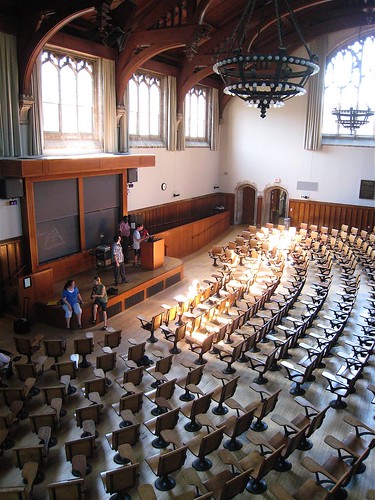
As a freshman, on my first foray into the Mudd Library, I was initially shocked by the wide array of documents contained there. Looking aimlessly through the online catalog I came upon an entry entitled Commencement Records. Ah, I thought, I’ll look for Orientation Records, see how previous generations spent that Frosh Week I’ve just been through. I plugged orientation into the catalog, no results.
After trying various degrees of orientation, first week, entering, and freshmen, I finally came upon a document entitled Information for students entering the freshman class of 1907 (-1912).
Upon reading it I realized why I couldn’t find any orientation information…there was no orientation. The booklets for each year were slim and mentioned no events for freshmen. The closest thing to an event was a mention in the 1909 edition of a class meeting in McCosh 50. McCosh 50, the room this years class nearly filled for an optional lecture on community service!
Yup, this one.

What else did the book say?
Well, bummed you have to take a writing seminar or a ST?
Try this list:
“Candidates for the AB degree have 16 exercises per week during Freshman year divided as follows
Latin 4
Greek 4
Mathematics 4
English 2
French or German 2”
BS candidates were in addition required to take 4 exercises of Physics. No one is allowed to take chemistry in 1908 unless getting a CE degree, but by 1911 all are required to take either Physics or Chemistry. Those taking chemistry should attend the first lecture and bring a notebook. Nice remainder.
I know what you’re thinking. “Practically no option is allowed freshman year.” But it’s ok. The book foresees this complaint but encourages students that some electives are available sophomore year and in junior year they may pick a department to concentrate in “from the eleven departments”. The breadth of choice is outstanding.
Careful though. “If entrance conditions remain after Sophomore Year an extra 2 hour course in the subject is required and a fee of 10 dollars paid therefor.”
Even then you can test out of German or French into either a higher or more modern level. Annouce your choice “after Chapel”. (This is the Marquand Chapel as the University Chapel wasn't built till eight years later!)
These old announcements also brought today’s fast paced Ivy admissions fervor into perspective.
In 1911 or 1912 freshman had to look for the following at Nassau Hall:
“A list of candidates recommended for admission to the Freshman class will be posted on 12 o clock Wednesday September 20th” if they saw their name they were to “register at once”.
“Those whose names do not appear may consult the Committee On Entrance” and possibly be Admitted on Trial, the book helpfully adds.
Once registered, get out your purse…
“All bills must be paid within the first four weeks.”
Payment plans, a thing of the future.




3 comments:
This is actually quite interesting and I commend you on writing this. Even though it wasn't published in the Prince, it is far more interesting than anything I've seen in my time on campus.
If you continue to have the time, it would be great to see a series of posts like this.
I have a Princeton Catalogue from 1922-23.
Some differences: you could sit for entrance exams in June in dozens of cities, and they would mail you a report of your grade/acceptance/rejection.
You had electives as freshmen. You had to take two of:
Greek or Latin,
English,
Foreign Language
Math
Science
continuing from subjects you took in high school, plus two electives.
If one was going for a BS in science (not engineering), Math was required instead of Latin/Greek.
Engineers had a fixed curriculum. All engineering freshmen took:
Fall:
Analytical Geometry
Modern Language (German if ChemE)
Chem 101 or 103
English 101a
Engineering Drawing 101
Hygiene
Spring:
Differential calculus
Continuation of above courses
Instead of Hygiene, Industrial Development 101.
Sophomore & Junior years were equally fixed, by department. Other than Electrical, engineers could start taking one elective a term as juniors. EEs could only take electives as seniors.
Engineers had to take a hygiene course? Why was that dropped??
Post a Comment